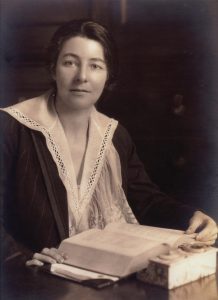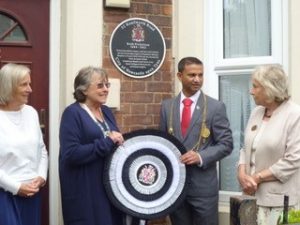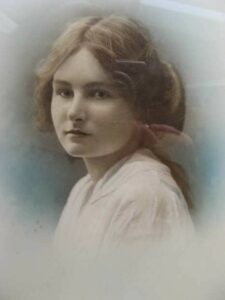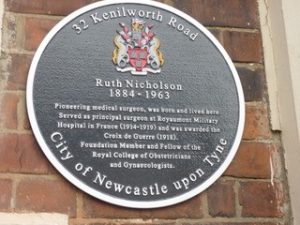DR. RUTH NICHOLSON
 We are extremely proud to have nominated Dr Ruth Nicholson for a plaque commemorating her life and work as a pioneering surgeon in WW1(awarded the French Croix de Guerre) and later as a founder and a Fellow of the Royal College of Obstetrics and Gynaecologist. Our Lord Mayor (Councillor Habib Rahman) unveiled the plaque Friday, August 27th 2021.
We are extremely proud to have nominated Dr Ruth Nicholson for a plaque commemorating her life and work as a pioneering surgeon in WW1(awarded the French Croix de Guerre) and later as a founder and a Fellow of the Royal College of Obstetrics and Gynaecologist. Our Lord Mayor (Councillor Habib Rahman) unveiled the plaque Friday, August 27th 2021.
Several club members there were President Christine, Christine Lo., Christine Lu. Doreen and Heather.
The main speakers were Professor Alison Murdoch ( representing the Royal College of Obstetricians and Gynaecologists) and Baroness Joyce Quin. About 10 relatives of Ruth Nicholson attended including Rosemary who was married to Ruth’s nephew. They were thrilled and very pleased that this honour had been given to their relative and very proud of the plaque.
Ruth attended Newcastle Church High School and in 1904 she enrolled at the city’s College of Medicine aged 19. She was the sole female graduate at the end of her course five years later.
Her career began in Newcastle and then Edinburgh, before missionary work took her to a field hospital in Gaza where she worked until the outbreak of the First World War.
Despite her experience Ruth was prevented from working in male-dominated British military hospitals, but she rose to prominence at an all-female hospital supported by the French government.
She joined the unit established by Scottish Women’s Hospitals founder Elsie Inglis at Royaumont Abbey, to the north of Paris. From December 1914 to March 1919 she shared the bulk of the major surgical workload and played a pivotal role tending to soldiers injured at the Battle of the Somme. Over one eight-day period, she managed just 16 hours of sleep.
For her services in treating French soldiers at Royaumont she was awarded the Croix de Guerre and the Medaille d’Honneur des Epidemies by the French Government.
After the war she began a career in Obstetrics and Gynaecology, becoming a founder member of the Royal College of Obstetrics and Gynaecology in 1929 and a Fellow of the college two years later. She was appointed Clinical Lecturer and Gynaecological Surgeon at the University of Liverpool in 1930 and later she became the first woman president of the North of England Society of Obstetrics and Gynaecology.
Ruth Nicholson passed away in 1963, aged 79.
Cllr Habib Rahman, Lord Mayor of Newcastle, said: “Women today play a leading role in medicine, but clearly it hasn’t always been that way.
“Ruth Nicholson paved the way for women to enter a male-dominated field, making a significant impact and saving countless lives during and after the First World War in the process and I’m delighted her achievements will forever be remembered at her place of birth in our city.”
Christine Tomkins, on behalf of Newcastle Soroptimists who nominated Ruth Nicholson to Newcastle City Council’s Commemorative Plaque Scheme, said: “Soroptimists International, which this year celebrates its 100th anniversary, is a global women’s volunteer movement.
“Advocating for human rights and gender equality, members work on projects that support women and girls to achieve their individual and collective potential and at Newcastle Soroptimists we are proud to have sponsored this commemorative plaque for Ruth Nicholson. She was a pioneering woman and someone who achieved much to demonstrate gender equality in the field of medicine.”
David Langhorne, Assets and Development Director at YHN, said: “We are so proud that someone as pioneering as Ruth Nicholson once lived in one of the properties we manage and we’re pleased that her remarkable work has been commemorated in this way. We know that so many of the people living in homes managed by YHN are making fantastic contributions to our city, whether through their professional endeavours or valuable community work so who knows, we may see someone else honoured in this way in future.”
The plaque commemorating Ruth Nicholson was unveiled by the Lord Mayor at 32 Kenilworth Road, Elswick, at 11am on Friday August 27th 2021.
BLUE PLAQUE – 2
Dr. DOROTHEA W. SINTON M.B., Ch.B. 1899 to 1987
On Friday September 23rd at 12 noon, a commemorative plaque will be unveiled by the Lord Mayor of Newcastle at 18 North Avenue in Gosforth. This is to mark the significant contribution of Dr. Dorothea W. Sinton to medical and wellbeing services to the poorest women in Newcastle, particularly in providing birth control advice which was in its infancy in the 1920’s. This was during a period when birth control was considered against the teaching of established religious groups. and women found it extremely difficult to secure gynaecological support.
This event welcomes members of the public to come and honour a pioneering woman in our city. The plaque is being sponsored by Soroptimist International Newcastle upon Tyne, a voluntary women’s organisation dedicated to educating, enabling and empowering women to have an equal voice in our communities.
During the 1920’s, there was extensive public debate about the rights and wrongs of birth control. Advice clinics run by voluntary organisations consolidated their positions, and the fight centred on seeking to remove an official ban which prevented Local Authorities from providing contraception services. Into this fray entered Dr Dorothea Sinton, a newly qualified doctor who had trained at Liverpool Medical School qualifying in 1923, marrying John Harold Sinton from the Wirral in the same year and subsequently they moved to Newcastle upon Tyne.
At the same time progress was being made in Newcastle when a visiting representative from the beginnings of what was to become the ‘Family Planning Association’ in London, Mrs Tamplin, arrived to form a voluntary committee to start a Women’s Advisory Clinic. She found the first premises to be used as a clinic at 670 Scotswood Road which had been a pawn shop in a slum area. It was primitive, rat infested and all hot water had to be heated on a primus stove. However, the progress on forming a supportive committee and attracting funds was more difficult due to the prevailing attitude that this type of medical service was somewhat wicked and immoral. The ladies who were interested in supporting the project could not tell their husbands the truth and the local clergy and medical practitioners were against any progress. Then in 1929, Dr Sinton became the brave pioneer to move this project forward and, as a new and independent doctor in the city, was able to direct and progress the aim of bringing free medical services to the poorest women who already had large families to raise. The establishment of this first Clinic was uphill work and initial funding came from donations of £100 each from Lady Denham and the Durham Miners Welfare Committee. It was uphill work to begin with, as local doctors and clergy had to think of their own bread and butter before linking their names to birth control.
It was a struggle to form a committee of local and influential women to run and raise funds to continue and expand the Women’s Advisory Clinic but in 1934 the clinic was able to move from 670 Scotswood Road to improved premises at 24 Shieldfield Green due to the ongoing support of Dr Sinton’s husband. Woman came for all kinds of gynaecological conditions, as well as for birth control, as they had never had a woman Doctor in the area before. They also came for advice on infertility, which Dr Sinton describes as surprisingly successful given the resources that she had. She was fortunate in finding Mrs. Murray Brooks who worked with her for over 20 years as her Nursing Superintendent who had extensive experience of nursing throughout World War One also in less than ideal conditions.
Dr Sinton fought publicly for the equal rights to education for women, and the recognition of the role of women doctors. In April 1943, she had a letter published in the British Medical Journal advocating the role of women doctors working alongside their male counterparts. She asked her medical colleagues to “look at past and prevailing social and economic conditions in order to discover the causes of the declining birth rate. The reasons, for the existence of contraception services was to enable motherhood, not to degrade it. There is nothing dignified in a diseased woman bringing a sickly child into a poverty-stricken household “. Later Dr Sinton was able to open additional Clinics in the colliery villages around Ashington and Sunderland.
This Commemorative Plaque provided by the City of Newcastle upon Tyne has been sponsored by Soroptimist International Newcastle upon Tyne club who strive to improve the inequalities in the recognition of the contribution that unique women made to our City. Dr Dorothea Sinton and Mrs. Murray Brooks were founder members of this worldwide women’s voluntary organisation when the Newcastle club was chartered in 1937. Their contribution to the improvement in the health and wellbeing of women on Tyneside will not be forgotten.




